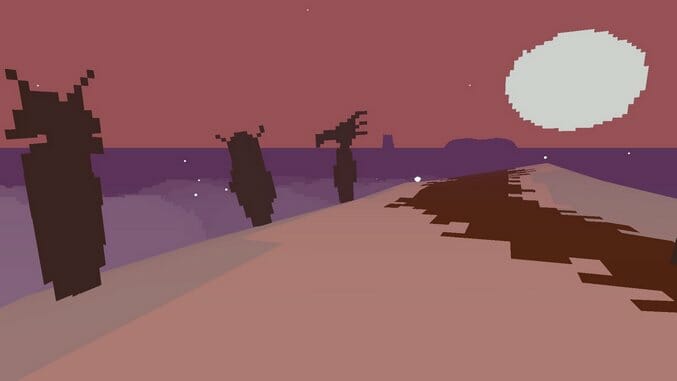Proteus (PC/Mac)

Time moves slowly. Not in real life, where 1995 might as well be two weeks ago, but in the game Proteus. Proteus is about time, about change, about the cycle of nature and its supreme indifference towards us. Time advances as we explore Proteus’s island in first-person—day reliably cedes to night, and the island’s colors and wildlife gradually change with the seasons. It’s nowhere close to real-time, but the days linger, and seasons are far apart. Until the night (and it’s always a night) when we discover one of Proteus’s many mysteries and learn how to hurtle through the future into the next season in just a few seconds.
Time isn’t fixed in Proteus, and learning how to jump from spring straight to summer is just one of the many secret tricks we uncover as we stroll across the island. Nothing’s quite explained, and nothing’s necessarily essential—we can fast forward to winter if we want, but it’s never something we have to do. There’s no way to win Proteus—we just experience it until it ends or until we hold the ESC key down long enough to close our character’s eyes.
There are no clear goals other than leisurely perambulating through the game’s procedurally generated terrain. Low-key diversions do appear as we explore, though. We can chase a frog for hours for no reason other than it being a thing that we can do. Crumbling castle towers share an odd magical connection. The circle of animal-shaped statues at the top of the island’s tallest mountain serves a purpose, but like everything in Proteus, we have to figure out that purpose on our own, and it’s not absolutely crucial to enjoying the overall experience.
This might make Proteus sound less than challenging. That’s true, but why do we always need a challenge? We’re one of the laziest cultures in the history of this planet—why draw the line here when almost everything we do is some form of relaxation?
Relaxation is one of Proteus’s primary goals. It’s an extremely soothing game. The warm but muted palette looks like something from an old Sierra game, or maybe even an MS Paint piece. The minimalist score gurgles and hums in the background like a cheery Philip Glass piece, with slight but noticeable melodic motifs tailored to the season. Many of our actions directly impact the music—birds make loud squawks as they frantically run away from us, trees and flowers twinkle as we walk through them, and almost every interaction with flora or fauna generates a musical response. Between the archaic aesthetic and repetitive, almost drone-like music, Proteus is probably the closest we’ll ever get to playing King’s Quest in La Monte Young’s Dream House.
